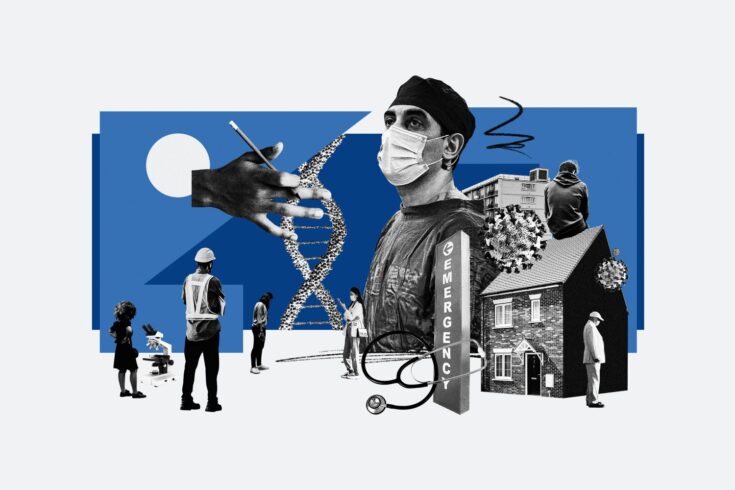I remember a meeting in early February 2020 at which the well-known epidemiologist Professor Neil Ferguson gave an overview of what was likely to happen with the spread of COVID-19. I came out and it was like I knew a meteor was about to hit and the world hadn’t yet realised.
A few weeks later, on the first day that people were told to stay at home, I was in London for an essential review meeting of our COVID-19 response. We had our Economic and Social Research Council colleagues with us. As they surveyed those empty streets, I saw the same fear in their eyes I had felt when we’d discussed health impacts. What would be the implications for the economy, if no-one was going to work and how could we respond?
The impact of COVID-19 began in health, but it was like throwing a big rock into a lake and the ripples spread out to areas such as the economy and education. Through that difficult time, we came together effectively and were able to respond across all our disciplinary strengths.
Our COVID-19 response was world-leading
Today we published an independent evaluation of UK Research and Innovation’s (UKRI) response to the pandemic. You must take your hat off to our researchers and innovators.
The report found that the UK directed more of its research and innovation activity to COVID-19 than any other country. That work also had more measurable impact than in any other country.
Our contribution to understanding and addressing COVID-19 was world-leading.
However, it’s clear that the UK did not get everything right, and a public inquiry is looking into how we can better respond to future emergencies.
So, what have we learned as UKRI and as a research and innovation community?
Success was built on decades of investment
The first thing to understand is that the research and innovation success during COVID-19 was built on decades of prior investment. We were skimming the cream of that investment.
We launched a competitive COVID-19 funding opportunity in early February 2020 and one of the successful applicants was Professor Sarah Gilbert of the University of Oxford with a proposal that ultimately became the Oxford/AstraZeneca vaccine.
Sarah was able to quickly design and begin to implement that vaccine in a weekend. How could that be?
When I joined MRC 15 years ago, I was working on how we could improve the ways we turned scientific breakthroughs into applications in the clinic.
One of the early projects we supported was work by Sarah to develop a universal flu vaccine using an entirely new technology, a viral vector.
We already knew the vaccine could work
A few years later we supported a proposal that came from the MRC Human Immunology Unit and again from Sarah Gilbert to use the same technology to develop a vaccine for MERS (Middle East respiratory syndrome), which is a coronavirus.
We had established that the technology worked, and that it worked with a coronavirus. This meant that Sarah was able to kick start the development of the COVID-19 vaccine in just one weekend.
It was something of a personal journey for me as I received the Oxford/AstraZeneca vaccine in February 2021. I am so grateful to have both contributed to and then benefited from its development.
We funded its very early development, and it’s important to acknowledge the huge contribution of the whole biotechnology community and AstraZeneca in getting that vaccine into people’s arms. It normally takes 10 years to make a vaccine and together we did it in 10 months.
In addition to knowing that the vaccine worked, it was critical to understand vaccine roll out and how best to engage with harder to reach communities.
The vaccine investment is only one example. We were also leaning on years of investment in modelling of disease outbreaks and tracking of viruses, on the knowledge of people with very early understanding of the Wuhan outbreak, on historic work in genome sequencing and on long-term surveys into how people behave.
Nobody had thought about lockdown
It’s well known that the UK had focused on preparing for one type of pandemic but had encountered something entirely different. We hadn’t ever really contemplated a full lockdown.
The lockdown raised many new questions and social science research played an essential role in informing key policy measures such as furlough.
Also, one of the challenges of the virus was many people were asymptomatic. You didn’t necessarily know they were transmitting and couldn’t easily take the biosecurity measures you would to contain viruses such as Ebola.
We must be better prepared for a much wider range of emergencies and not only infections. These emergencies could be climactic or volcanic, for example.
We must be ready for the impacts not just on health but elsewhere such as on the wider economy.
Many questions will demand political answers, but we need to be able to develop robust and independent evidence so our political leaders understand the risks.
We are seeking to be better prepared
We are giving thought to what a broader UKRI preparedness strategy might look like.
We are looking at our organisational resilience. Many of our teams were dedicating a huge amount of time to our COVID-19 response. We tend to work in a domain-specific way and are not so good at pooling people behind a ‘breach’. If we fall over, we can’t support the community to make the impact we critically need.
Constant uncertainty was also a character of the pandemic. There were always new questions. Once we had the vaccine, we had to ask whether it worked in people with cancer or immune deficiencies.
We must challenge ourselves on what we could have known better, but, of course, you cannot know everything.
We also recognise that we must step in front of the curtain a bit more. We found ourselves directing the research and innovation community and that was quite a cultural change for us. We need to ensure our people have the confidence and empowerment to do that.
Another key area is for us to have greater public voice in our priority-setting. We had the academic voice and the government voice but little to tell us what the priorities were in communities, particularly in those most impacted.
We need to look to the future, learning the lessons the pandemic has taught us and provide the sustainable long-term investment that will empower our sector to step up to the mark, should another pandemic come knocking on our doors.
Rich relationships at the heart of our response
Above all, our COVID-19 response was a team effort. The relationships, many of which we forged across councils through work on antimicrobial resistance, were instrumental in our ability to respond quickly.
That response isn’t just technical, it’s around people and the relationships we have. UKRI has those rich organisational and individual relationships that give us an agility. You can move so much more quickly if you’re moving from a position of existing trust than if you’re trying to build that at the same time.
Challenges and questions remain
We’re keenly aware that COVID-19 and its impacts haven’t disappeared from our lives. The UK’s research and innovation community will continue to contribute to our collective effort to monitor new variants, track spread and address the pandemic’s impacts, including Long-COVID.
Top image: Credit: UKRI




